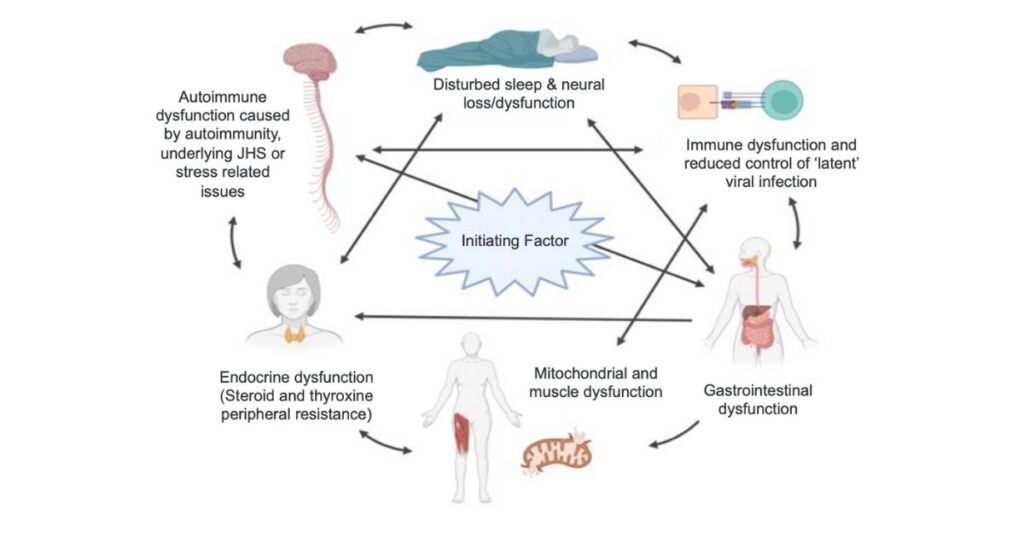Are you constantly battling unexplained fatigue and swelling? The lymphatic system, lymphedema, and chronic fatigue syndrome (CFS) might be more connected than you think. This article explores the intricate relationship between these conditions, offering insights into how they affect your health and well-being. Let’s dive in.
Symptoms and Causes of Lymphedema
Lymphedema symptoms include persistent swelling, a feeling of heaviness, and skin changes. The cause of lymphedema can vary, as summarised below. The impact of lymphedema on daily life can be considerable.
| Type of Lymphedema | Cause |
|---|---|
| Primary Lymphedema | Genetic defects in the lymph system (rare) |
| Secondary Lymphedema | Often occurs after cancer treatment or surgery, where lymph nodes are removed or damaged (more common) |
Diagnosis of Lymphedema
Diagnosing lymphedema involves a physical exam, assessing medical history, and sometimes imaging tests like lymphoscintigraphy to evaluate lymph flow. Early diagnosis is crucial for effective treatment and managing lymphedema symptoms. Different stage of lymphedema requires tailored management strategies.
Exploring Fatigue
What is Fatigue?
Fatigue is more than just feeling tired; it’s a persistent sense of exhaustion that doesn’t improve with rest. It can be physical, mental, or emotional, and it significantly interferes with daily activities. When cancer patients experience cancer-related lymphedema, the associated fatigue can further diminish their health-related quality of life.
Types of Fatigue
Fatigue presents in various forms, including acute fatigue from short-term stressors and chronic fatigue, which lasts for six months or longer. Chronic fatigue syndrome is a complex disorder characterised by extreme fatigue that isn’t relieved by rest and can worsen with physical or mental activity. Lymphedema may exacerbate feelings of fatigue.
Fatigue and Its Impact on Daily Life
Fatigue can affect every aspect of daily life, from work and school to social interactions and personal care. It can lead to decreased productivity, impaired concentration, and reduced overall quality of life. The combination of lymphedema and fatigue can be particularly debilitating, requiring comprehensive management strategies. [Insert Internal Link]
Chronic Fatigue Syndrome Overview
What is Chronic Fatigue Syndrome?
Chronic fatigue syndrome (CFS), also known as myalgic encephalomyelitis (ME/CFS), is a complex, chronic illness characterised by extreme fatigue that is not improved by rest and may be worsened by physical or mental activity. The symptoms of chronic fatigue syndrome are often debilitating and can significantly impact daily life. Understanding the intricacies of chronic fatigue syndrome is essential for effective management and treatment of the disease. Individuals experiencing persistent fatigue should seek medical advice to explore potential causes and appropriate interventions.
Symptoms of Chronic Fatigue Syndrome
Chronic fatigue syndrome presents a range of symptoms that significantly affect daily life. Here’s a summary of some common symptoms:
| Symptom Category | Specific Symptoms |
|---|---|
| Fatigue-Related | Persistent fatigue, post-exertional malaise (PEM), unrefreshing sleep |
| Pain and Cognitive | Muscle pain, joint pain, cognitive dysfunction (brain fog) |
These symptoms can vary in severity and fluctuate, impacting health-related quality of life and requiring a multifaceted management approach.
Diagnosis and Challenges of CFS
Diagnosing chronic fatigue syndrome can be challenging because there are no specific diagnostic tests, and many symptoms overlap with other conditions. The diagnostic process typically involves ruling out other potential causes of fatigue and identifying a cluster of characteristic symptoms. The lack of objective markers makes it difficult to differentiate chronic fatigue syndrome from other fatiguing illnesses, leading to delays in diagnosis and appropriate treatment. Addressing these diagnostic challenges is crucial to improving patient outcomes and alleviating the burden of chronic fatigue syndrome.
The Lymphatic System’s Role
How the Lymphatic System Works
The lymphatic system is a critical part of the immune system, responsible for maintaining fluid balance and protecting the body from infection. It consists of a network of vessels, tissues, and organs that transport lymph, a fluid containing white blood cells, throughout the body. The lymphatic system helps to remove waste, toxins, and abnormal cells, playing a vital role in immune function. Proper functioning of the lymphatic system is essential for overall health, and any disruption can lead to various health issues, including lymphedema.
Impact of Lymphatic Health on Fatigue
The health of the lymphatic system can significantly impact fatigue levels. When the lymphatic system is not functioning efficiently, it can lead to a buildup of toxins and waste products, contributing to feelings of fatigue and sluggishness. Conditions like lymphedema, which impair lymphatic drainage, can exacerbate fatigue. Supporting lymphatic health through practices such as regular exercise, proper hydration, and lymphatic drainage techniques may help to reduce fatigue and improve overall energy levels. The impact of lymphedema on fatigue is an important consideration in comprehensive care plans.
Lymphatic Drainage Therapy Explained
Lymphatic drainage therapy is a specialised technique designed to stimulate the flow of lymph fluid and improve lymphatic system function. It involves gentle, rhythmic movements to encourage the movement of lymph, helping to reduce swelling and promote detoxification. Lymphatic drainage therapy can be performed manually by a trained therapist or with the assistance of specialised devices. This therapy is often used in the management of lymphedema and can also be beneficial for individuals experiencing chronic fatigue and swelling. Lymphatic drainage may alleviate some symptoms of lymphedema.
Overlap Between Lymphedema, Fatigue, and CFS
Common Symptoms and Experiences
There is a notable overlap in symptoms and experiences between lymphedema, fatigue, and chronic fatigue syndrome. Many individuals with lymphedema also report significant fatigue, which can further impair their ability to function. Similarly, those with chronic fatigue syndrome often experience symptoms suggestive of impaired lymphatic function. The interplay between these conditions highlights the importance of a holistic approach to diagnosis and management.
| Common Symptoms | Conditions |
|---|---|
| Persistent Fatigue, Swelling, Pain, Cognitive Dysfunction, Reduced Health-Related Quality of Life | Lymphedema, Chronic Fatigue Syndrome |
Research on the Connection
Emerging research suggests a potential connection between lymphedema, fatigue, and chronic fatigue syndrome. Some studies have explored the role of inflammation and immune dysfunction in these conditions, finding common pathways that may contribute to overlapping symptoms. Research indicates that impaired lymphatic drainage may lead to increased inflammation, which can exacerbate fatigue and other symptoms associated with chronic fatigue syndrome. Further investigation is needed to fully elucidate the complex relationship between these conditions and to identify potential targets for intervention. Further studies may explore whether lymphatic drainage alleviates the symptoms of chronic fatigue syndrome.
Case Studies and Real-Life Examples
Case studies and real-life examples illustrate the complex interplay between lymphedema, fatigue, and chronic fatigue syndrome. For instance, breast cancer survivors with lymphedema often report experiencing significant fatigue that impacts their daily lives. Individuals with chronic fatigue syndrome may also exhibit signs of impaired lymphatic function, such as swelling or tenderness in the lymph nodes. These examples underscore the need for healthcare professionals to consider the potential overlap between these conditions when evaluating and treating patients. These case studies also show the impact of lymphedema on fatigue.
Management and Treatment Options
Managing Lymphedema Effectively
Effectively managing lymphedema involves a multifaceted approach aimed at reducing swelling and improving the flow of lymph. One of the primary methods for managing lymphedema is compression therapy, which includes the use of compression garments to support the affected limb. These garments help to promote lymphatic drainage and prevent fluid from accumulating. Regular exercise and maintaining a healthy weight are also crucial components of lymphedema treatment, aiding in enhancing lymphatic function and overall well-being. Proper skin care is also essential to prevent infections, which can exacerbate lymphedema symptoms.
Treating Fatigue and CFS
Treating fatigue, especially in the context of chronic fatigue syndrome, requires a comprehensive and individualised approach. There is no one-size-fits-all solution, and treatment often involves a combination of lifestyle modifications, medications, and supportive therapies. Strategies may include pacing activities to avoid overexertion, improving sleep hygiene, managing stress, and addressing any underlying medical conditions that may be contributing to fatigue. Medications may be used to manage specific symptoms such as pain or sleep disturbances. Supportive therapies like cognitive-behavioural therapy (CBT) and graded exercise therapy (GET) can also be beneficial for some individuals. When cancer patients experience cancer-related lymphedema, treatment of fatigue is important.
Role of Lymphatic Drainage in Treatment
Lymphatic drainage therapy plays a significant role in the treatment of both lymphedema and fatigue. By stimulating the flow of lymph, lymphatic drainage can help to reduce swelling, remove toxins, and improve immune function. Manual lymphatic drainage, performed by a trained therapist, involves gentle, rhythmic massage techniques to encourage the movement of lymph fluid. This therapy can be particularly beneficial for individuals with lymphedema or those experiencing fatigue related to impaired lymphatic function. In the context of chronic fatigue syndrome, lymphatic drainage may help alleviate some symptoms. Lymphatic drainage may alleviate some symptoms of lymphedema and can improve overall well-being.
Practical Tips for Patients
Daily Management Strategies
For patients dealing with lymphedema and fatigue, incorporating daily management strategies is crucial for improving their health-related quality of life. Wearing compression garments consistently can significantly reduce swelling and discomfort. Gentle exercises and stretches can promote lymphatic drainage and improve circulation. Maintaining a healthy diet rich in fruits, vegetables, and lean protein can support overall health and energy levels. Practising good skin care to prevent infections is also essential. Additionally, incorporating relaxation techniques, such as deep breathing or meditation, can help manage stress and reduce fatigue. Daily lymphatic drainage may also help manage lymphedema symptoms.
Seeking Professional Help
Seeking professional help is an important step for individuals experiencing lymphedema, fatigue, or chronic fatigue syndrome. A healthcare provider can conduct a thorough evaluation to determine the underlying cause of symptoms and develop an appropriate treatment plan. Specialists such as lymphedema therapists, physical therapists, and occupational therapists can provide targeted interventions to manage swelling, improve mobility, and enhance overall function. Mental health professionals can also offer support and strategies for coping with the emotional challenges associated with these conditions. For cancer patients, seeking help after cancer treatment is essential.
Support Networks and Resources
Building a strong support network and accessing available resources can greatly benefit individuals living with lymphedema, fatigue, and chronic fatigue syndrome. Support groups provide a safe and supportive environment where patients can share their experiences, learn from others, and gain valuable insights. Online forums and communities offer a convenient way to connect with others and access information. Numerous organisations and non-profits provide resources, education, and advocacy for individuals affected by these conditions. Local lymphedema treatment centres can also offer advice and practical support. These support networks can help manage lymphedema symptoms.
Recap of Key Insights
In summary, the relationship between lymphedema, fatigue, and chronic fatigue syndrome is complex and multifaceted. Lymphedema, characterised by swelling due to impaired lymphatic drainage, can significantly contribute to fatigue. Chronic fatigue syndrome, a debilitating condition marked by persistent fatigue, often shares overlapping symptoms with lymphedema. The lymphatic system plays a crucial role in immune function and fluid balance, and its dysfunction can exacerbate fatigue and swelling. Effective management strategies involve compression therapy, lymphatic drainage, lifestyle modifications, and professional support. Improving lymphatic drainage alleviates the symptoms of chronic fatigue syndrome.
Final Advice for Patients
For individuals navigating the challenges of lymphedema, fatigue, and chronic fatigue syndrome, remember that you are not alone. It is essential to advocate for your health, seek out knowledgeable healthcare professionals, and actively participate in your treatment plan. Embrace self-care practices that promote physical and emotional well-being. Build a strong support network and connect with others who understand your experiences. Stay informed about the latest research and treatment options. And above all, be patient with yourself and celebrate small victories along the way. Early treatment of lymphedema is critical to manage the impact of lymphedema.
Frequently Asked Questions
Q1: Can lymphedema cause fatigue?
Yes, impaired lymphatic drainage can lead to a buildup of toxins and inflammation, contributing to fatigue.
Q2: What is the main cause of lymphedema?
Secondary lymphedema, often resulting from cancer treatment or surgery, is the most common cause. Primary lymphedema is rare and results from genetic defects in the lymph system.
Q3: How can lymphatic drainage help with fatigue?
Lymphatic drainage can help remove toxins and improve immune function, potentially reducing fatigue.
Q4: Are compression garments effective for managing lymphedema swelling?
Yes, compression garments support lymphatic drainage and prevent fluid accumulation, reducing swelling.
Q5: Where can I find support for chronic fatigue syndrome and lymphedema?
Numerous organisations and online communities offer resources, education, and support for these conditions.





